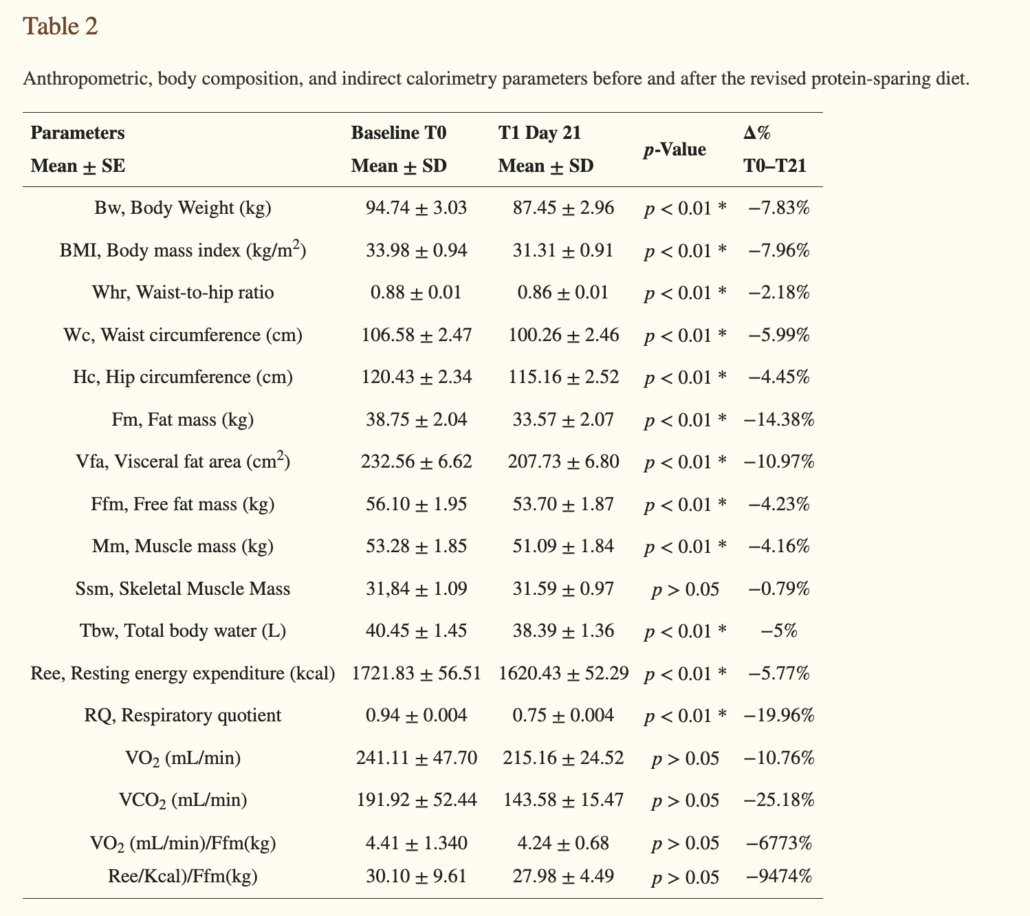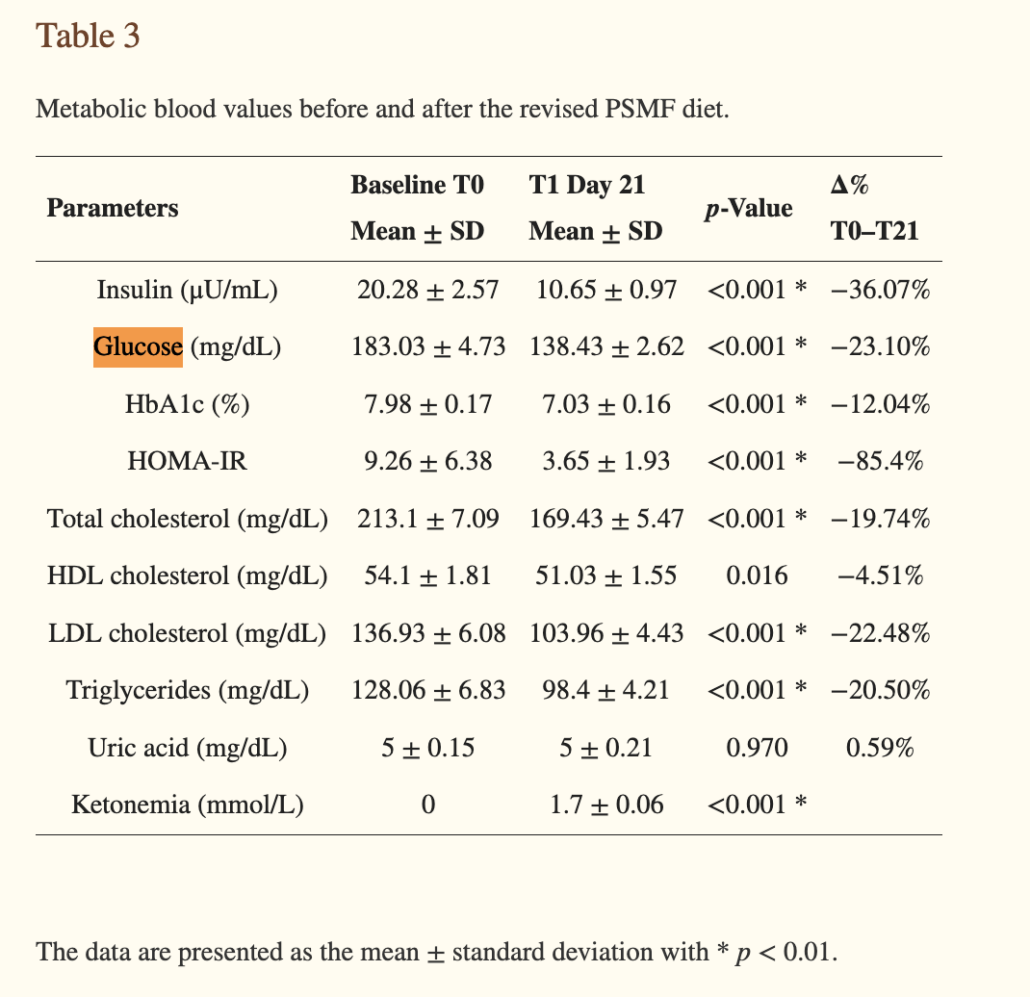We include products in articles we think are useful for our readers. If you buy products or services through links on our website, we may earn a small commission.
Protein-Sparing Modified Fast: Review and Alternatives

The Protein-Sparing Modified Fast, or PSMF, is touted as a way to quickly lose significant weight without depleting muscle mass. But like other crash diets that require extremely low caloric intake i.e. starving yourself, there may be various unwanted side effects, and most people don’t keep weight off once the diet is over.
In this article, we’ll explore what the protein-sparing modified fast is, how to do it, along with its potential benefits and drawbacks.
Table of Contents
What is a Protein Sparing Modified Fast
The Protein-Sparing Modified Fast (PSMF) is a dietary approach designed for rapid weight loss while preserving lean muscle mass.
“Protein-sparing” refers to the intention of sparing muscle mass by maintaining a high protein intake relative to fat and carbohydrates.
Unlike prolonged fasting and intermittent fasting, PSMF requires strict and extreme caloric restriction. In fact, this PSMF is so extreme that it usually requires medical supervision and is practiced only by people who are dangerously overweight.
That said, many people choose to practice PSMF on their own, while some athletes have incorporated principles of PSMF into higher calorie approaches like the apex predator diet
How to do a protein-sparing modified fast
The protein-sparing modified fasting protocol entails two phases that we’ll detail below.
Phase 1: Intensive Calorie Restriction
During the intensive phase, you restrict caloric intake to fewer than 800 daily calories, most of which come from lean, high-protein foods.
In fact, the protocol requires consuming 1.6 grams of protein per kg of body weight, or .7 grams of protein per pound.
For a 170-pound person, this works out to around 120 grams of protein.
Foods most commonly consumed on the PSMF include lean meats, tofu, poultry, fish, eggs, and low-fat dairy. Added fats like oils and butter are eliminated. Carbohydrates are capped at approximately 20 grams per day. This means essentially no grains, legumes, fruits, or added sugars.
To protect against nutrient deficiencies, people supplement with potassium, calcium, magnesium, sodium, and multivitamins.
This phase can last up to six months to achieve weight loss goals.
Phase 2: Refeeding
The refeeding phase lasts 6-8 weeks, in which dieters slowly reintroduce fats and carbohydrates in a graduated process.
In the first month, up to 45 grams of carbohydrates are permitted per day. In the second month of refeeding, this goes up to 90 grams of carbs per day.
At the same time, protein intake is reduced by 1-14 grams per month.
Ketosis on the PSMF
PSMF dramatically restricts carbs. This causes the body to enter a metabolic state called ketosis, in which body fat is broken down into powerful energy molecules called ketones.
Therefore the PSMF is technically a type of ketogenic diet. But all other ketogenic diets are high in fat with moderate protein intake. The high-fat component is to fulfill a strict metabolic need for fat, which we will get into later.
Foods to Eat on a PSMF
PSMF is centered around lean foods that are high in protein. These include
- Skinless poultry
- Lean cuts of beef and pork
- Lean fish like cod, halibut, and tuna
- Low-carb vegetables such as broccoli, cabbage, cauliflower, and leafy greens
- Low-fat dairy such as cottage cheese, yogurt, and skim milk
- Eggs and/or egg whites
- Tofu
Foods to Avoid on the PSMF
All high-carb and high-fat foods are avoided on the PSMF. These include
- Processed and packaged foods such as chips, baked goods, candy, and fast food
- Fruits such as melons, apples, berries
- Fats and oils such as butter, olive oil, margarine, coconut oil, vegetable oils, and dressings
- High-carb vegetables such as potatoes and essentially all tubers
- Grains and pseudo-grains including wheat, oats, quinoa
- Legumes such as peanuts, navy beans, peas
- Sugary beverages such as soda, juice, energy drinks, sweetened tea and coffee
- Sweeteners including table sugar, honey, maple syrup
- Full-fat dairy
Is the PSMF effective for Weight Loss?
Dramatically restricting calories, as is the case on the PSMF diet, generally leads to rapid weight loss. But decades of studies tell us that keeping weight off after extreme dieting is rare.
A 2022 study with 25 men and 25 women who were obese and type-2 diabetic used a revised version of the PSMF that updated macronutrient intake. Researchers found significant reductions in weight and various measures of body mass after 21 days. See chart below.

Source: Cincione RI, Losavio F, Cibelli G, et al. Revised Protein Sparing Diet in Obesity and Type 2 Diabetes Mellitus. Nutrients. 2022
A small 2016 study with 12 obese adolescent participants found that over a six-month PSMF period, participants lost an average of 25 pounds (11kg), equivalent to 10% of average total body weight.
Similar results were found in a 1985 study of 15 adults. Over only six weeks, participants lost an average of 32 pounds (14 kg) without losing significant muscle mass.
A 2020 study tracked weight loss outcomes of over 1400 people, 800 of whom were on the PSMF diet. The roughly 600 other participants were on various other diets.
Researchers found that the PSMF diet resulted in rapid weight loss over six months. However, a very small percentage of PSMF dieters maintained significant weight loss 3-5 years after completing it. Ultimately, PSMF was found to be no better than any other diet–most of which are far less difficult to follow.
Other studies have found that most dieters regain more than 50% of their weight within 2–3 of ending their PSMF.
Other Studies on the Benefits of PSMF
Dramatic dietary changes are going to affect more than weight loss. Studies on the PSMF have tracked various physiological outcomes. Let’s take a look.
Cholesterol
One study found that short-term PSMF decreased LDL (bad) cholesterol levels by 20% while also decreasing HDL (good) cholesterol. However, the total HDL-C/LDL-C ratio increased–creating an overall improved lipid profile.
A 2022 study found that after just 21 days, a PSMF diet reduced total cholesterol by 19.74%, LDL cholesterol by 22.48%, and total triglycerides by −20.05% for obese people with type 2 diabetes.
Blood Pressure and Blood Sugar
In the large-scale study comparing PSMF dieters vs. all other diets, researchers found that at year 1, PSMF dieters had a greater decrease in blood pressure (− 6.6 mmHg versus − 5.0 mmHG, p = 0.02), but there was no statistically significant difference between groups in years 2–5.
This same study found a 23.1% decrease in blood glucose levels after 21 days. This makes sense when considering that on this “revised” version of PSMF, carbs were reduced to near zero.

Source: Cincione RI, Losavio F, Cibelli G, et al. Revised Protein Sparing Diet in Obesity and Type 2 Diabetes Mellitus. Nutrients. 2022
Downsides to PSMF
Though practicing a PSMF may provide significant short-term weight loss and improved metabolic health markers, this diet requires the supervision of a healthcare professional.
Such a restrictive dietary approach is only recommended for people who are dangerously obese–or with a body mass index greater than 27. It’s also not suitable for older people, women who are pregnant or breastfeeding, and people with a history of eating disorders.
Adverse reactions to PSMF include
- unstable mood, anxiety, and depression
- nausea
- lethargy
- dehydration
Safer and More Sustainable Alternatives to PSMF
If you’re looking to lose excess weight and improve overall metabolic health, there are less challenging, more enjoyable, far more nutritious, and ultimately more sustainable dietary interventions available.
Ketogenic Diets
For example, a study of 22 obese men with metabolic syndrome practicing the non-calorie-restricted Mediterranean Keto Diet found that all 22 participants no longer had any markers of metabolic syndrome after only six weeks.
Participants in this study lost an average of 30 pounds while consuming delicious, nourishing, fatty whole foods.
Animal Based Diets
Another non-calorie-restricted low-carb, high-fat approach gaining popularity is the carnivore diet. This diet calls for eating only animal products, especially fatty cuts of red meat.
A 2021 study out of Harvard gathered self-reported data from 2,029 people who had been eating nothing but meat for at least six months.
Significant outcomes included:
- 93% improved or resolved obesity and excess weight
- 93% improved hypertension
- 98% improved conditions related to diabetes
- 97% improved gastrointestinal symptoms
- 96% improved psychiatric symptoms
- 98% of participants reported being very satisfied or satisfied
The authors of the study concluded, “Contrary to common expectations, adults consuming a carnivore diet experienced few adverse effects and instead reported health benefits and high satisfaction.”
Dr. Robert Kiltz has created his own version of the carnivore diet known as the B.E.B.B.I.I.S plan (pronounced babies).
BEBBIIS stands for Bacon, Eggs, Butter, Beef, Ice cream (Kiltz’s homemade keto ice cream), Intermittent feasting, and Salt.
This way of eating is specially formulated to help his fertility patients conceive. This diet reduces inflammation, boosts vital nutrients, and provides healthy fats and cholesterol that the body needs to synthesize key hormones that support fertility.
The bottom line
A protein-sparing modified fast is an extremely restrictive approach to achieving rapid weight loss without suffering significant muscle loss.
PSMF entails dramatically restricting total calories, carbs, and fats while increasing protein. It is so extreme that it is only recommended to obese individuals and conducted under close medical supervision.
Some studies have found that in the short term, PSMF produces weight loss and improves blood pressure, cholesterol, and blood sugar levels. But long term studies have found that these improvements generally do not last, with participants gaining back significant weight within two years of completing the six-month fast.
If your goal is to take control of your metabolic health through diet, you are better served by non-calorie restrictive and far more nourishing approaches like ketogenic and carnivore eating plans.




















